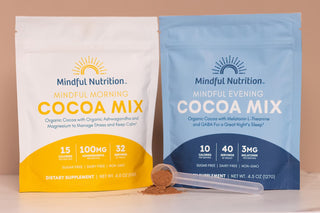In the United States, over 140 million people use sugar substitutes as part of their diet. If you're craving a sweet treat but counting your calories, it might be time to swap your sugar with stevia.
Stevia is a zero-calorie sweetener that's extracted from the leaves of the Stevia rebaudiana plant. Not only is it a treat for your taste buds, but it can be added to your daily diet.
Keep reading, and we'll tell you what you need to know about stevia vs. sugar.
Key Takeaways: Stevia Vs. Sugar
- Stevia is a plant-based, zero-calorie sweetener that is sweeter than sugar (in more ways than one!)
- Sugar can contribute to fluctuations in energy levels.
- Stevia has a significantly lower glycemic index than table sugar.
- Since it contains zero calories, stevia can be used as a sugar alternative for those looking to reduce calorie or sugar intake.
See Related: What’s the Difference Between Hot Chocolate and Hot Cocoa?
What Is Stevia? The Zero-Calorie Sweetener
When you hear the word "sweet," your mind may jump to "sugar." But there's another sweetener out there that may be the key to you enjoying your desserts guilt-free.
Stevia, which is also referred to as sweet leaf or sugar leaf, is a zero-calorie sweetener. Yes, that's right - this extract has zero calories and is all-natural.
Derived from the Stevia rebaudiana plant, this sweetener is often used as a sugar substitute in baked goods, cold drinks, and warm beverages, including our sugar-free Mindful Calm Hot Cocoa.

Though stevia is a very popular sugar substitute, it's been used for centuries in herbal medicine.
Breaking Down the Sweet Side of Stevia
If you're a fan of sugar, it's hard to imagine that something could be sweeter than sugar. But did you know that the steviol glycoside molecules in raw stevia are 250 to 300 times sweeter than sugar?
These molecules are extracted from the leaves of the stevia plant. Here's what that process looks like:
This process starts with the dry stevia leaves being steeped in water, before the stevia leaf particles are filtered out. The liquid is then treated with carbon to remove the leftover organic matter, and then it undergoes an ion exchange treatment to remove the minerals and metals.
Once those steps are complete, you're left with glycosides. These glycosides are concentrated into a resin, and then you have a concentrated stevia leaf extract. This concentrated extract can be used to make a variety of stevia-based sweeteners.
What's the Difference Between Stevia and Sugar Substitutes?
What sets stevia apart from other sugar substitutes or sugar alcohols like erythritol or xylitol? There are quite a differences between stevia and artificial sweeteners or sugar alcohols.
The biggest one is the fact that stevia is plant-based and comes straight from Mother Nature. If you want the closest thing to sugar, then you're best off with stevia.

What's the Deal With Artificial Sweeteners?
Most artificial sweeteners are chemically manufactured or synthesized. Some companies choose to blend their stevia with artificial sweeteners like aspartame or sucralose to balance out the flavor profile.
However, you don't need to settle for artificial sweeteners if you're trying to steer away from sugar.
So, let's go over the reasons why stevia is making a name for itself in the world of wellness.
Bonus: Does Hot Chocolate Help You Sleep?
Stevia as a Sugar Alternative
Whether you're searching for low-calorie sweetened beverages for the summer, or a way to make your homemade gooey brownies a bit healthier, stevia is here to save the day. Here are just a few of the health benefits of stevia extract:
- Low-calorie sweetener: One of the biggest reasons why people turn down sugar in favor of stevia extract is calories.That's because stevia has zero calories, making it the queen of low-calorie sweeteners.
- Blood sugar control: Stevia has a lower glycemic index than sugar. Because it has a low glycemic index, it won't affect your blood sugar, meaning you can savor this Organic Skinny Hot Cocoa Mix (made with stevia instead of sugar) any day, any time.
Stevia is a popular choice of sweetener for many people. Unlike sugar, it contains zero calories and does not contribute to tooth decay. Replacing sugar with stevia could be the change you need.
Table Sugar Vs. Stevia Sweeteners
There are a few things that differentiate table sugar from stevia sweeteners. For starters, they have slightly different tastes.
Sugar has a pure and undiluted sweetness to it - you know, the flavor that we all know and love. Stevia can have a bitter aftertaste, and the flavor is often described as grassy or licorice-like. However, many products contain other ingredients that balance the taste of the stevia, so that you're always left with a satisfying treat for your taste buds.

However, one of the biggest differences between regular sugar and stevia sweeteners is their glycemic index (GI).
GI is a number out of 100 that indicates how quickly a carbohydrate-containing ingredient is digested. Refined sugar has a GI of 65, with 100 being the highest GI. Stevia, on the other hand, has a GI of 0.
Randomized controlled trials showed that stevia doesn't negatively impact blood glucose levels or insulin levels. Plus, steviol glycosides are considered safe by both the Food & Drug Administration (FDA) and the World Health Organization (WHO), and are approved by the European Food Safety Authority (EFSA).
The Bottom Line
Whether you're watching your sugar intake or trying to cut down on your calorie intake, stevia is a great way to enjoy the finer things in life without compromising on your health goals. Personally, we enjoy the potential health benefits and powerful flavor that it brings, which is why we include it in many of our sugar-free hot chocolates.
But regardless of your choice of sweetener, turn your moment of indulgence into a mindful experience.
Savoring your hot beverages can be enjoyable and advantageous on its own. Hot cocoa with stevia is ideal for a comforting daily routine, helping you feel grounded and comforted when you bring your mug to your lips.
Savor the flavor, warmth, and scent of your hot cocoa, and enjoy the power of healthy living.
Keep Reading: Everything You Need to Know About Cacao

People Also Ask
Which Is Healthier, Sugar or Stevia?
Your choice of sweetener, whether it be sugar or stevia, is a decision that should be determined by your overall lifestyle, health goals, and personal preferences.
Both sugar and stevia have their pros and cons, but stevia is usually the go-to option for those craving a sweet escape without compromising on their wellness goals.
What Is Better, Monk Fruit or Stevia?
Stevia is a natural sweetener with fewer calories, but some prefer other natural sweeteners, such as monk fruit. Monk fruit is palatable and slightly sweeter than stevia, making it a favorite for many. But monk fruit can be more difficult to find in grocery stores, while stevia is more widely available.
What Are the Downsides of Stevia?
Stevia is a better option than sugar for quite a few reasons, but like any other sweetener, it has a couple of downsides.
Some find that stevia can have a bitter aftertaste, and others find it can cause an upset stomach with chronic consumption. If you aren't a fan of the slightly bitter taste of stevia, we do offer plenty of hot cocoa mixes with traditional sugar instead.
Is Stevia Bad for You?
Stevia is generally considered safe for consumption when used in moderation, per the Food and Drug Administration (FDA).
--
Mindful Nutrition is a veteran-owned company with a passion for wellness. We use natural ingredients in our products, including melatonin, GABA, ashwagandha, and L-Theanine. Our hot cocoa blends are vegan, non-GMO, and plant-based, crafted to be a comforting addition to your daily ritual. We utilize third-party testing on all products to ensure purity, quality, and safety. To stay connected and learn more, follow us on Facebook, Instagram, and LinkedIn.
--
These statements have not been evaluated by the Food and Drug Administration. Our products are not intended to diagnose, treat, cure, or prevent any disease. The content on this website is for informational purposes only and is not intended as a substitute for advice from your physician or other healthcare professional. Always consult with a qualified healthcare provider regarding any medical condition or health concerns.















